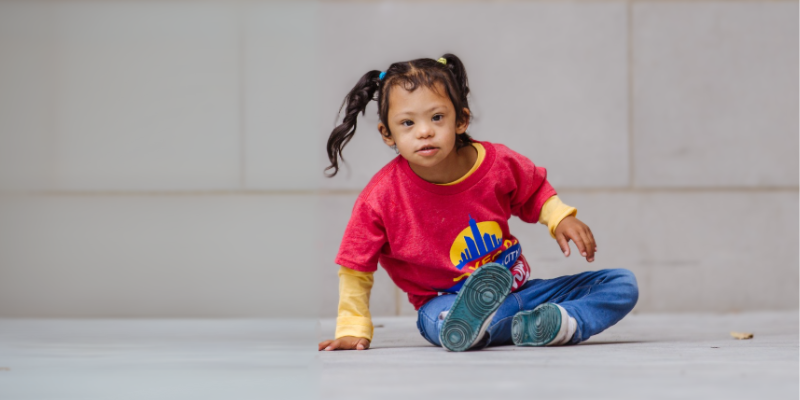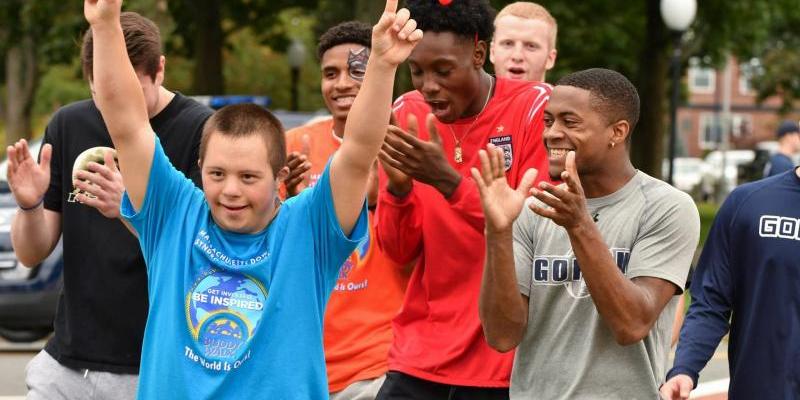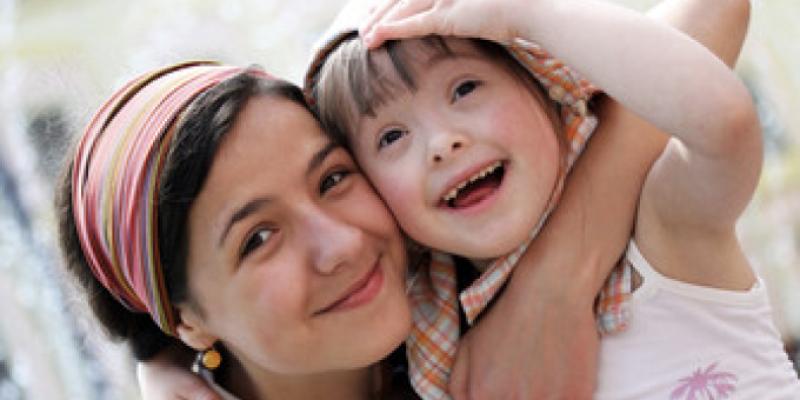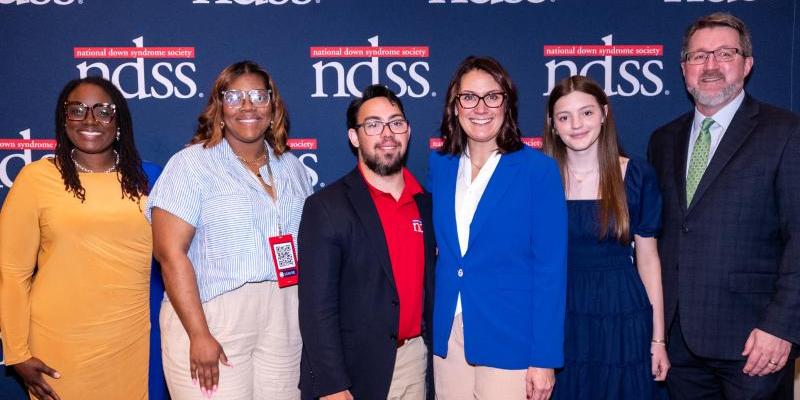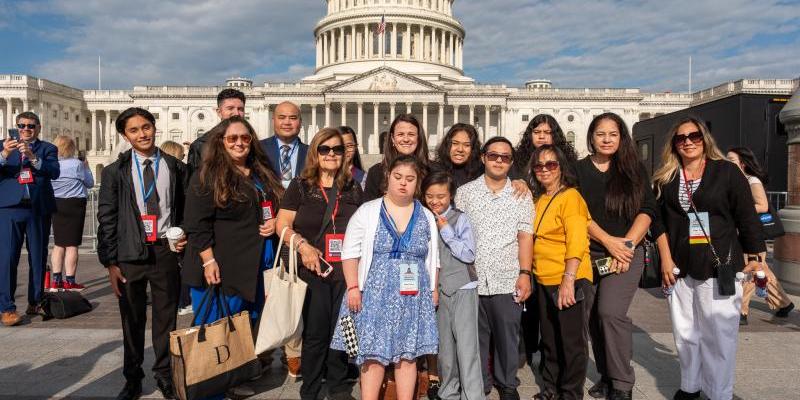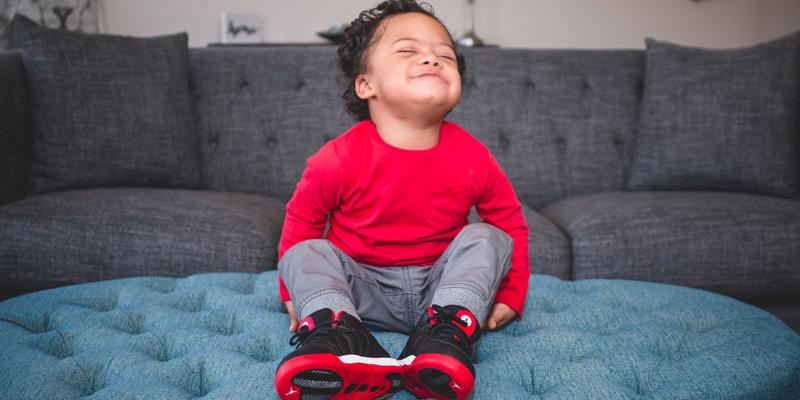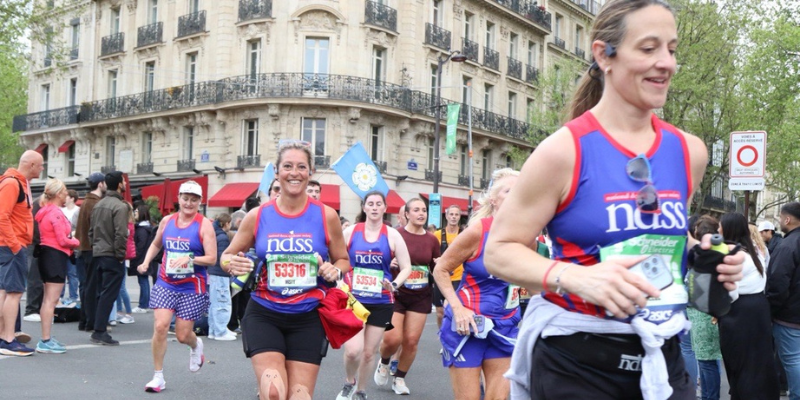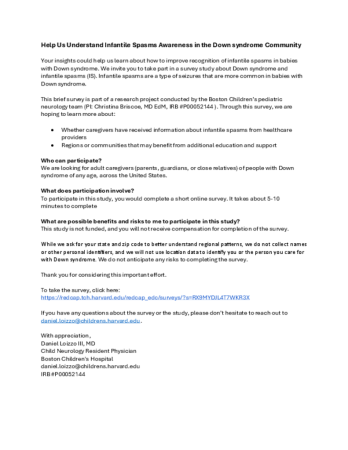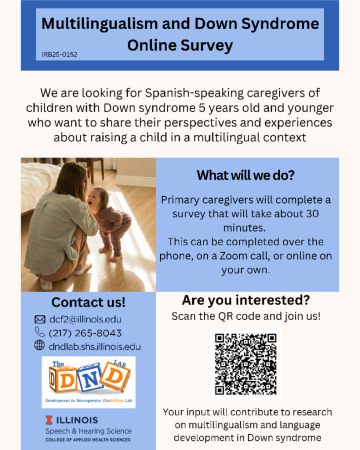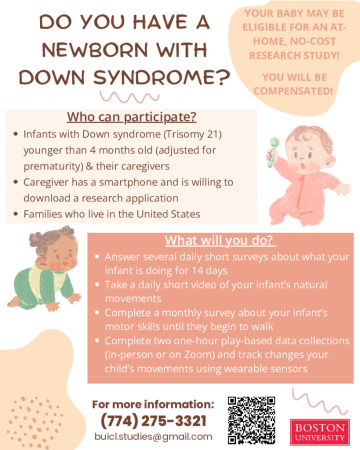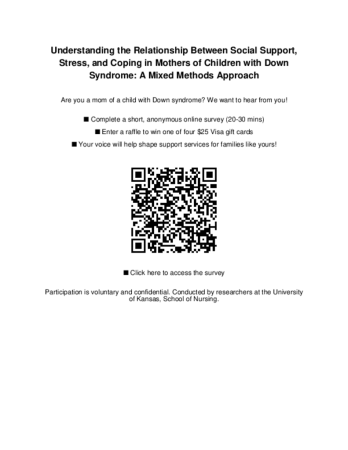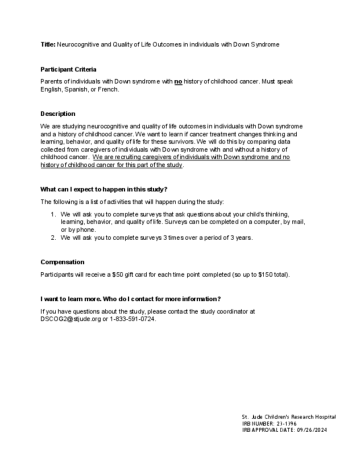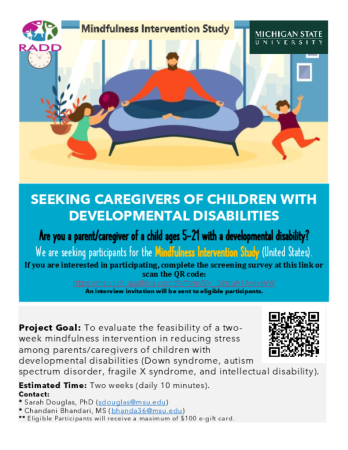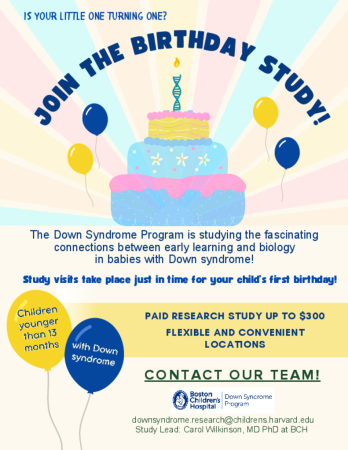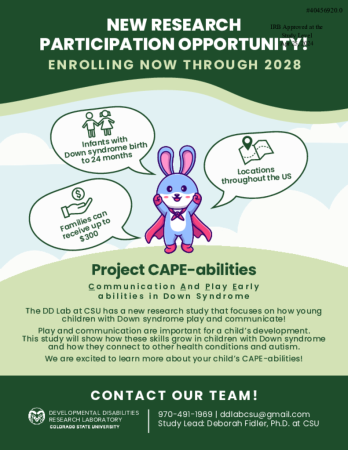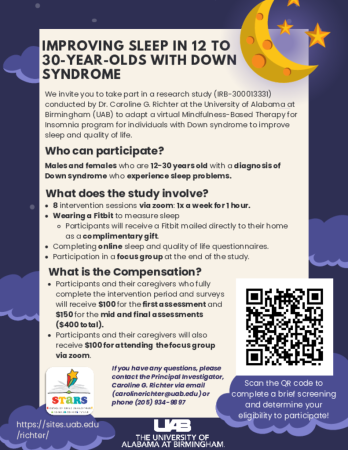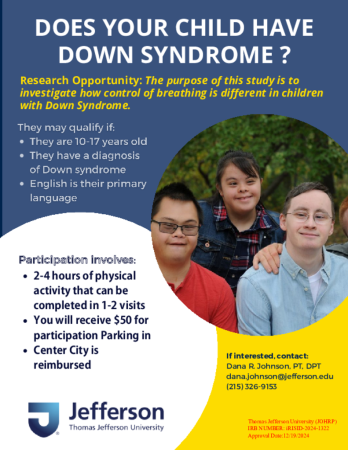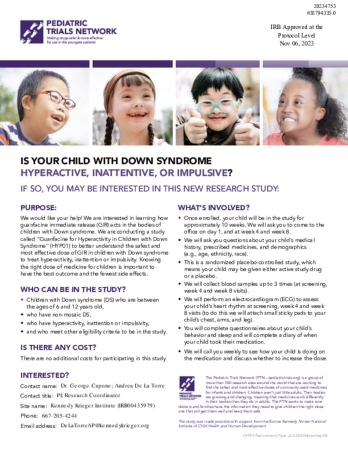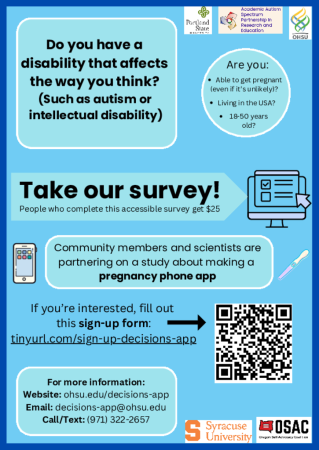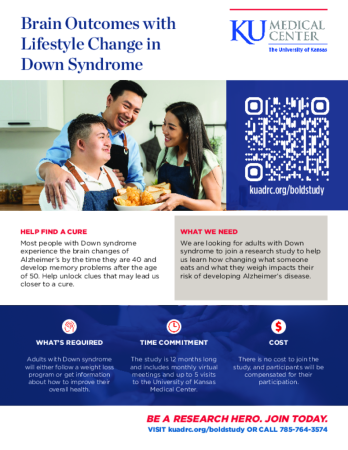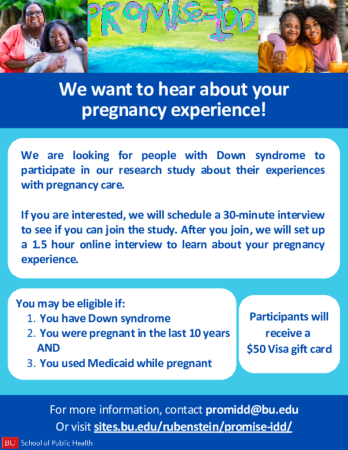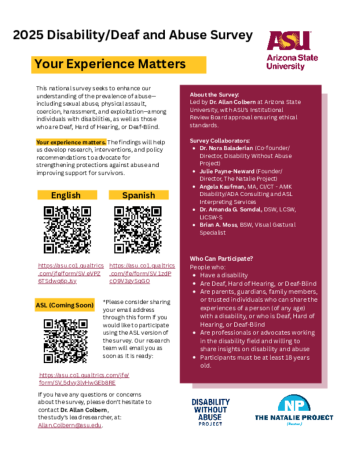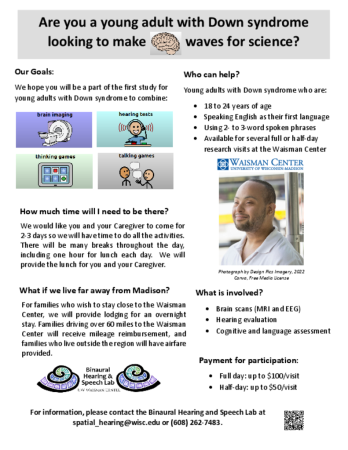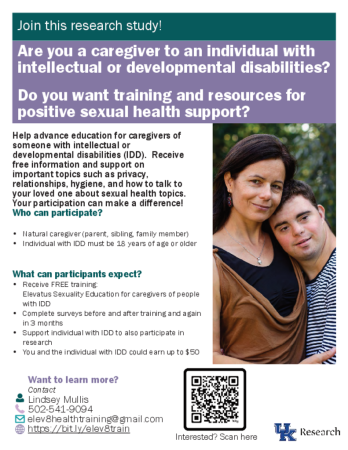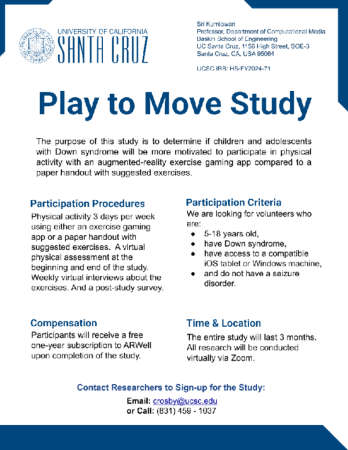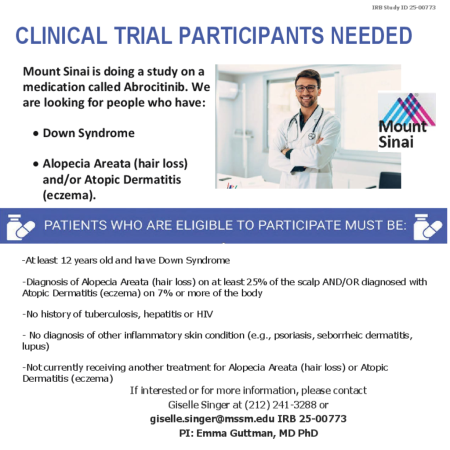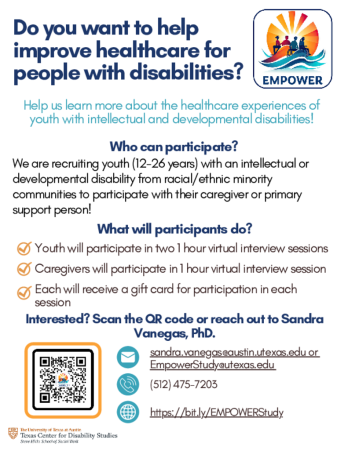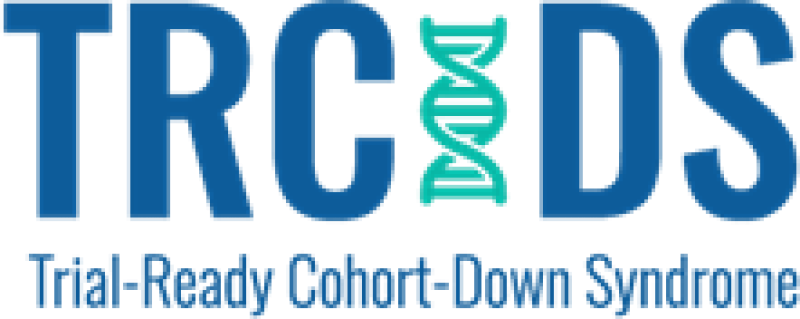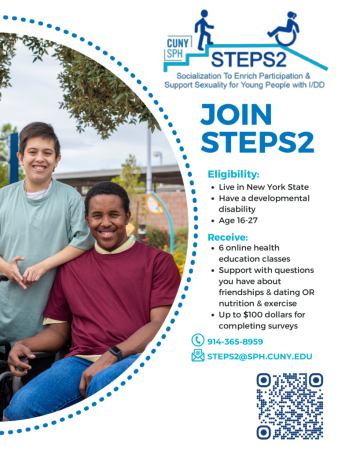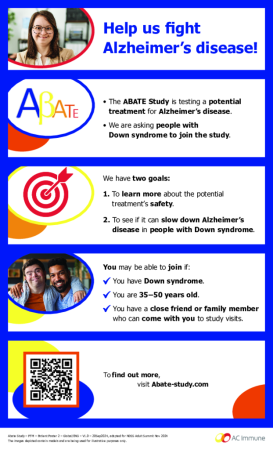The studies shared here have been submitted to NDSS by the researchers and have been reviewed for listing and suggested as information that may be of interest to caregivers and those with Down syndrome by members of our Scientific and Clinical Advisory Board. The SciCAB does not review or approve the study. That is documented by the Institutional Review Board of the relevant institution. NDSS does not endorse any study. Apply to have your study shared by clicking the box below.
Research Opportunities Interest Form
Caregivers
Assessing Caregiver Awareness of Infantile Spasms Risk in Children with Down Syndrome
Learn more
Your insights could help researchers learn about how to improve recognition of infantile spasms in babies with Down syndrome. Researchers invite you to take part in a survey study about Down syndrome and infantile spasms (IS). Infantile spasms are a type of seizures that are more common in babies with Down syndrome. Participants must be adult caregivers of people with Down syndrome of any age. Participants will complete an online survey that will take 5-10 minutes.
Contact Info
Multilingualism in Down syndrome: Exploring Spanish-speaking Caregivers' Perspectives and Challenges/ Multilingüismo en el síndrome de Down: explorando las perspectivas y desafíos de los cuidadores de habla hispana
Learn more
This study is looking for Spanish-speaking caregivers of children with Down syndrome 5 years old and younger who want to share their experiences and perspectives about raising a child in a multilingual context. Participants will complete a survey virtually in English or Spanish. This study hopes to amplify Spanish-speaking caregivers’ voices, informing inclusive supports, shaping policy, promoting equity, and shifting perceptions to empower children with Down syndrome and their families. Learn more
Contact Info
Moving Forward: Early Predictors of Crawling and Walking in Infants with DS
Learn more
This study is a first step in developing individualized physical therapy guidance for infants with Down syndrome based on their anticipated milestone achievement and assist with the allocation of resources among children with Down syndrome. Caregivers can participate if they have an infant with Down syndrome that is younger than 4 months old. Participants will answer daily short surveys and take daily short videos of their infant’s natural movements. Participants will also complete monthly surveys and two one-hour play-based data collections that can be in-person or on Zoom.
Contact Info
Understanding the Relationship Between Social Support, Stress, and Coping in Mother of Children with Down Syndrome: A Mixed Methods Approach
Learn more
Researchers are examining parental stress, coping, and social support in families raising children with Down syndrome, which will guide future advocacy and resources to strengthen family well-being and promote inclusion and health equity. Participants must be a biological or adoptive mother or step-mother of a living child with Down syndrome between the ages of zero and 21, at least 18 years old, and English-speaking. Participation involves completing consent forms and an online survey. The survey will take about 20–30 minutes to complete. Participation is virtual, and participants who complete the survey will be entered into a raffle for one of four $25 Visa gift cards.
Contact Info
Neurocognitive and Quality of Life Outcomes in Individuals with Down Syndrome
Learn more
Researchers are studying neurocognitive and quality of life outcomes in individuals with Down syndrome and a history of childhood cancer. They want to learn if cancer treatment changes thinking and learning, behavior, and quality of life for these survivors. They will do this by comparing data collected from caregivers of individuals with Down syndrome with and without a history of childhood cancer. They are recruiting caregivers of individuals with Down syndrome and no history of childhood cancer for this part of the study.
Contact Info
Mindfulness Intervention for Family Caregivers/Parents of Children with Developmental Disabilities: A Feasibility Study
Learn more
Parents and caregivers of children with developmental disabilities often experience stress and a need for coping methods due to the unique challenges of caregiving. This study seeks to evaluate the feasibility of a brief, two-week online mindfulness intervention designed to reduce caregiver stress and promote overall well-being.
Contact Info
Birth-4 year olds
Infant Brain Imaging Study for Down Syndrome
Learn more
- This study’s goal is to increase our understanding of how the brain is affected in infants with and without Down syndrome. This may in turn provide clues that could eventually help identify therapeutic targets for intervention for individuals with Down syndrome.
- Who is eligible? Families with an infant (6 months or younger) diagnosed with Down syndrome. Expectant parents are encouraged to contact us.
About your visit: Your infant and a parent will:
Travel to your region’s site when your infant is 6, 12, and 24 months old. Each visit includes developmental assessments and an MRI scan during natural sleep (no sedation).
Receive reimbursement for study-related expenses and up to $300 compensation per visit.
Contact Info
The Birthday Study: Early Development in Down Syndrome
Learn more
This study aims to better understand early development in Down syndrome and characterize risk for co-occurring medical and psychological conditions to support early care and intervention. Children who participate must have a confirmed diagnosis of Down syndrome and be 11-13 months old at the time of the first visit. Participation consists of one visit (~2 hours) each year for three years. Visits must be conducted in person except in the case of medical concerns for travel. Study visits will include child play activities and caregiver questionnaires. Caregivers will also schedule a 1-hour virtual interview within 2 weeks of the in-person visit.
Contact Info
BRIDGE Study (BRain Indicators of Developmental Growth)
Learn more
Researchers in the Down Syndrome Program & the Labs of Cognitive Neuroscience at Boston Children’s Hospital are recruiting young children between 2 and 5 years old, with Down Syndrome (DS) to participate in a study investigating how differences in brain activity affect learning, language, and behavior in DS. This is for Children aged 24-66 months with Down syndrome.
What will you do?
2 visits, each one year apart, at the Labs of Cognitive Neuroscience at Boston Children’s Hospital.
Each visit includes clinical and behavioral assessments that will evaluate your child’s thinking, motor skills, language skills, and social communication. In addition, we will measure your child’s brain activity using electroencephalography (EEG).
EEG is a safe and radiation-free way to measure brain activity in response to different sounds and pictures.
What will you receive?
Families will receive a small toy and $50 per visit for participating. We will provide free parking and child care for siblings.
Families will receive a written report about their child’s development. Families can learn more about the lab by visiting wherekidshelpkids.org.
Contact Info
Development of Supported Stepping in Infants with Down Syndrome
Learn more
PURPOSE: To learn about the development of walking with mobility devices in infants and toddlers with Down Syndrome
WHAT IS INVOLVED: Tests of your child's motor skills and observation of your child taking steps on a treadmill and with a mobility device
WHO CAN PARTICIPATE: Children with Down Syndrome (10-22 months of age) who cannot walk independently
COMPENSATION: Families will receive $25 per 60-90 minute lab visit (up to 5 visits).
Contact Info
CAPEabilities: Communication and Play Early
Learn more
Children age 17-24 months with Down syndrome are invited to participate. We are studying how play and communication skills develop and connect to health and other conditions. Participation involves 1 to 2 research visits per year. Visits can be scheduled at locations and times that are convenient to families.
Contact Info
Moving Forward: Early Predictors of Crawling and Walking in Infants with DS
Learn more
This study is a first step in developing individualized physical therapy guidance for infants with Down syndrome based on their anticipated milestone achievement and assist with the allocation of resources among children with Down syndrome. Caregivers can participate if they have an infant with Down syndrome that is younger than 4 months old. Participants will answer daily short surveys and take daily short videos of their infant’s natural movements. Participants will also complete monthly surveys and two one-hour play-based data collections that can be in-person or on Zoom.
Contact Info
5-18 year olds
Down Syndrome Umbrella Study
Learn more
This study was created to capture individuals with Down syndrome who either don’t qualify or aren’t interested in our our studies. This is an a la carte study where you can pick and choose what you’d like to do. Do as little or as much as you’d like!
- Participants with Down syndrome ages 18 and older
- Must have Study Partner
- Questionnaires
- Minimal Cognitive Testing
- Blood Work
- Stool Sample
Contact Info
Improving Sleep and Quality of Life in Individuals with Down Syndrome and their Caregivers
Learn more
You can join this study conducted by Dr. Caroline G. Richter at the University of Alabama at Birmingham (UAB) to adapt a virtual Mindfulness-Based Therapy for Insomnia program for individuals with Down syndrome to improve sleep and quality of life. Participants must be 12-30 years old with a diagnosis of Down syndrome and experience sleep problems. The study involves 8 intervention sessions via zoom: 1x a week for 1 hour and wearing a Fitbit to measure sleep. Participants and their caregivers who fully complete the intervention period and surveys will receive $100 for the first assessment and $150 for the mid and final assessments ($400 total).
Contact Info
Respiratory Neural Drive in Down Syndrome
Learn more
The purpose of this study is to investigate how control of breathing is different in children with Down Syndrome than children without Down syndrome. This study looks at respiratory neural drive in children with Down syndrome ages 10 to 17 years old and will help medical professionals understand and address these challenges, helping to enhance physical health and reduce preventable complications. Travel to Philadelphia is required, participation will take around 2-3 hours, and participants will receive a $50 gift card plus the cost of parking.
Contact Info
Guanfacine for Hyperactivity in Children with Down Syndrome (HYPEbeGone_DS)
Learn more
This research study is being conducted to determine the efficacy of guanfacine immediate release (GIR) for the treatment of hyperactivity/impulsivity and inattention in children with Down Syndrome (DS) ages 6-12 years old after 8 weeks of treatment.
Contact Info
Pregnancy Decisions App Project - Survey
Learn more
The Pregnancy Decisions App Project (PDAP) is looking for participants for an online survey about disabilities and pregnancy. The survey takes about 30-60 minutes and can be done independently or with support from a study team member (phone or Zoom).
The goal of the project is to create a phone app for people with developmental disabilities, including autism and intellectual disabilities. The app will help people decide whether they want to get pregnant or not, as well as provide accessible resources and information about pregnancy. The survey will help us know what to put in the app. Participants must be 18-50 years old, live in the US, have a developmental disability, and be able to get pregnant (even if it is unlikely). Researchers hope to empower people with IDD to feel more confident in making their own reproductive health decisions. Participants will receive a $25 gift card for completing the survey.
Contact Info
Brain Outcomes with Lifestyle Change in Down Syndrome (BOLD)
Learn more
Researchers are looking for adults with Down syndrome (18-64) to join a research study to help us learn how changing what someone eats and what they weight impacts their risk of developing Alzheimer's disease.
Adults with Down syndrome will either follow a weight loss program or get information about how to improve their overall health. The study is 12 months long and includes monthly virtual meetings and up to 5 visits to the University of Kansas Medical Center. There is no cost to join the study and participants will be compensated for their participation.
Contact Info
Policies for Reproductive Outcomes in Medicaid–Improving Services for Enrollees with Intellectual and Developmental Disabilities (PROMISE-IDD)
Learn more
This study aims to better understand the challenges that parents with intellectual disabilities face during pregnancy while using Medicaid services. We aim to provide policy recommendations to improve health equity for disabled people who are pregnant. Participants will first complete an interest form with their contact information. A research assistant will then set up a 20-30 minute long Zoom or phone call to screen the participant for eligibility and enroll the participant into the study, if eligible. Then, the participant will schedule a 60-90 minute Zoom call with the interviewer. Participants will receive a $50 Visa or Amazon gift card. Learn more.
Contact Info
2025 National Disability/Deaf and Abuse Survey
Learn more
This study hopes to elevate the voices and experiences of individuals with disabilities regarding abuse. The results will help identify service gaps and promote trauma-informed, inclusive care. Participants will complete an online survey (available in English, Spanish, and ASL) and must be 18 years or older. The survey includes questions about lived experiences with abuse, impact, and support services. Participation is anonymous and voluntary. Individuals can participate as survivors, supporters, or professionals. Learn more and take the survey.
Contact Info
BRIDGE Study (BRain Indicators of Developmental Growth)
Learn more
Researchers in the Down Syndrome Program & the Labs of Cognitive Neuroscience at Boston Children’s Hospital are recruiting young children between 2 and 5 years old, with Down Syndrome (DS) to participate in a study investigating how differences in brain activity affect learning, language, and behavior in DS. This is for Children aged 24-66 months with Down syndrome.
What will you do?
2 visits, each one year apart, at the Labs of Cognitive Neuroscience at Boston Children’s Hospital.
Each visit includes clinical and behavioral assessments that will evaluate your child’s thinking, motor skills, language skills, and social communication. In addition, we will measure your child’s brain activity using electroencephalography (EEG).
EEG is a safe and radiation-free way to measure brain activity in response to different sounds and pictures.
What will you receive?
Families will receive a small toy and $50 per visit for participating. We will provide free parking and child care for siblings.
Families will receive a written report about their child’s development. Families can learn more about the lab by visiting wherekidshelpkids.org.
Contact Info
Hearing, Cognition, Language and Brain Imaging in Down Syndrome
Learn more
The impact of hearing loss on the speech, language, and cognitive skills of individuals with Down syndrome is largely unstudied. This study aims to bring into focus the importance of hearing health on the ability of these individuals to thrive.
Study participants must use English as their primary language, regularly communicate in 2- to 3-word spoken utterances, and be willing to undergo an MRI scan to participate. Participants will not be enrolled in the study if they have had a significant brain injury or have dementia. This study involves in-person participation at the University of Wisconsin Waisman Center in Madison, WI. Participation requires about 12 total hours, typically split across 2–4 visits; for families traveling from outside Madison, testing is usually scheduled over two consecutive days.
Individuals with Down syndrome will complete a hearing evaluation, listening games, cognitive tasks, an MRI, and an EEG. Caregivers will complete four questionnaires. Participants who complete the full study receive approximately $250. Families traveling more than 60 miles may receive travel reimbursement and hotel accommodations.
Contact Info
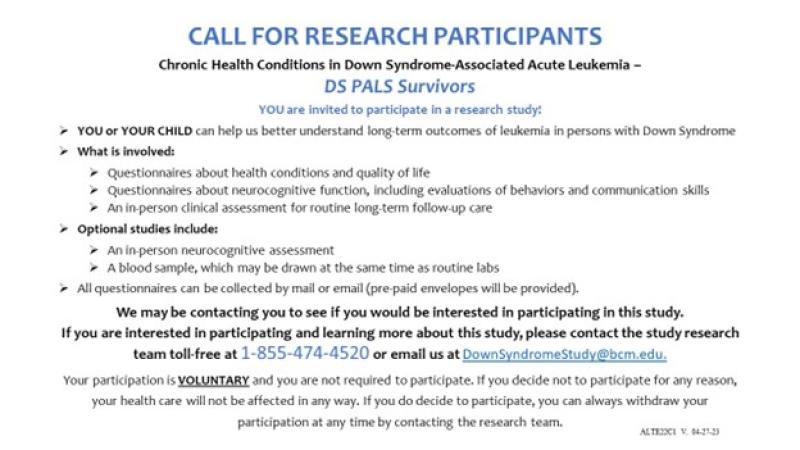
Chronic Health Conditions in Down Syndrome-Associated Acute Leukemia
Learn more
The DS PALS Survivors study is looking to better understand long-term outcomes of leukemia in individuals with Down syndrome. Participants will be asked to fill out questionnaires and attend an in-person clinical assessment.
Contact Info: Call toll free at 1-855-474-4520 or email at DownSyndromeStudy@bcm.edu
Contact Info
Ideas for Nurturing Teaching and Educating Receptive Caregivers On Uplifting Resources for Sexual Expression
Learn more
The primary aim of this study is to investigate the efficacy of the Elevatus caregiver training through outcomes on caregivers who complete the Elevatus program for supporting the sexuality of individuals with Intellectual and Developmental Disabilities (IDD). Secondly, the proposed study will explore outcomes experienced by the individuals with IDD supported by caregivers who receive the training. The training lasts approximately 2 hours and the surveys last from 5-20 minutes. All participants must be over the age of 18.
Contact Info
Play to Move
Learn more
The purpose of this study is to determine if children and adolescents age 5-18 with Down syndrome will be more motivated to participate in physical activity with an augmented-reality exercise gaming app compared to a paper handout with suggested exercises. The entire study will last 3 months. AU research will be conducted virtually via Zoom.
Contact Info
Treatment of Atopic Dermatitis and Alopecia Areata with Abrocitinib in Individuals with Down Syndrome
Learn more
Researchers are doing a study on a medication called Abrocitinib. They are looking for people who have Down syndrome and Alopecia Areata (hair loss) and/or Atopic Dermatitis (eczema).
If you decide to allow your child to take part in this research study, you/your child will be responsible for the following things:
· Going to all scheduled visits at the Upper East Side, NYC clinic location.
· Following the study staff’s instructions about the study.
· Telling the study staff about any illnesses or injuries your child experiences.
· Telling the study staff about any new or changes to medicines your child is taking (including vaccinations and contraception).
· Telling the study staff about any side effects or problems that occur during the study.
· Telling the study staff if your child plans to have any surgery or any other medical treatments or procedures for your child.
· Not getting any live vaccines (MMR [mumps, measles, rubella], chickenpox, FluMist). If your child is scheduled to receive one of these vaccines, please notify the study team in advance so that the study team can make any necessary changes in your child’s dosing schedule. If someone in your/your child’s household has received a live or attenuated vaccine please inform the study staff as soon as possible.
Contact Info
Evaluation and Measurement of healthcare transition Preparedness, Opportunities, and Wellness in Racially/Ethnically Diverse Youth with IDD (EMPOWER) Study
Learn more
This study aims to improve healthcare transition for youth with intellectual and developmental disabilities including Down syndrome from racial/ethnic minority communities. We are looking for youth aged 12-26 with an intellectual or development disability from racial/ethnic minority communities to participate with their caregiver or primary support person. Youth with IDD will participate in two 1-hour virtual interview sessions, and caregivers will participate in a 1-hour virtual interview session. All interviews will be conducted virtually, so travel is not required. Each participant will receive a gift card for completing each interview.
Contact Info
19-29 year olds
Down Syndrome Umbrella Study
Learn more
This study was created to capture individuals with Down syndrome who either don’t qualify or aren’t interested in our our studies. This is an a la carte study where you can pick and choose what you’d like to do. Do as little or as much as you’d like!
- Participants with Down syndrome ages 18 and older
- Must have Study Partner
- Questionnaires
- Minimal Cognitive Testing
- Blood Work
- Stool Sample
Contact Info
Brain Outcomes with Lifestyle Change in Down Syndrome (BOLD)
Learn more
Researchers are looking for adults with Down syndrome (18-64) to join a research study to help us learn how changing what someone eats and what they weight impacts their risk of developing Alzheimer's disease.
Adults with Down syndrome will either follow a weight loss program or get information about how to improve their overall health. The study is 12 months long and includes monthly virtual meetings and up to 5 visits to the University of Kansas Medical Center. There is no cost to join the study and participants will be compensated for their participation.
Contact Info
Policies for Reproductive Outcomes in Medicaid–Improving Services for Enrollees with Intellectual and Developmental Disabilities (PROMISE-IDD)
Learn more
This study aims to better understand the challenges that parents with intellectual disabilities face during pregnancy while using Medicaid services. We aim to provide policy recommendations to improve health equity for disabled people who are pregnant. Participants will first complete an interest form with their contact information. A research assistant will then set up a 20-30 minute long Zoom or phone call to screen the participant for eligibility and enroll the participant into the study, if eligible. Then, the participant will schedule a 60-90 minute Zoom call with the interviewer. Participants will receive a $50 Visa or Amazon gift card. Learn more.
Contact Info
2025 National Disability/Deaf and Abuse Survey
Learn more
This study hopes to elevate the voices and experiences of individuals with disabilities regarding abuse. The results will help identify service gaps and promote trauma-informed, inclusive care. Participants will complete an online survey (available in English, Spanish, and ASL) and must be 18 years or older. The survey includes questions about lived experiences with abuse, impact, and support services. Participation is anonymous and voluntary. Individuals can participate as survivors, supporters, or professionals. Learn more and take the survey.
Contact Info
Hearing, Cognition, Language and Brain Imaging in Down Syndrome
Learn more
The impact of hearing loss on the speech, language, and cognitive skills of individuals with Down syndrome is largely unstudied. This study aims to bring into focus the importance of hearing health on the ability of these individuals to thrive.
Study participants must use English as their primary language, regularly communicate in 2- to 3-word spoken utterances, and be willing to undergo an MRI scan to participate. Participants will not be enrolled in the study if they have had a significant brain injury or have dementia. This study involves in-person participation at the University of Wisconsin Waisman Center in Madison, WI. Participation requires about 12 total hours, typically split across 2–4 visits; for families traveling from outside Madison, testing is usually scheduled over two consecutive days.
Individuals with Down syndrome will complete a hearing evaluation, listening games, cognitive tasks, an MRI, and an EEG. Caregivers will complete four questionnaires. Participants who complete the full study receive approximately $250. Families traveling more than 60 miles may receive travel reimbursement and hotel accommodations.
Contact Info
Ideas for Nurturing Teaching and Educating Receptive Caregivers On Uplifting Resources for Sexual Expression
Learn more
The primary aim of this study is to investigate the efficacy of the Elevatus caregiver training through outcomes on caregivers who complete the Elevatus program for supporting the sexuality of individuals with Intellectual and Developmental Disabilities (IDD). Secondly, the proposed study will explore outcomes experienced by the individuals with IDD supported by caregivers who receive the training. The training lasts approximately 2 hours and the surveys last from 5-20 minutes. All participants must be over the age of 18.
Contact Info
Trial-Ready Cohort-Down Syndrome
Learn more
The Trial-Ready Cohort-Down Syndrome, or TRC-DS, matches people with Down syndrome to clinical trials related to Alzheimer’s disease. TRC-DS routinely monitors study participants for any changes to their brain health or function over time through blood tests and brain imaging to eventually match them with applicable Alzheimer’s disease clinical trials. Because participants are routinely evaluated, researchers can fast-track them for enrollment into qualifying clinical studies as soon as they are eligible and matched with one.
Healthy adults between the ages of 25 and 55 with Down syndrome are eligible to participate. Participants will visit their nearest research center once every 16 months for physical exams (like blood pressure checks and blood draws), memory skills tests, and brain scans to measure changes in their brain health and function.
Visit https://www.trcds.org/ and find the research center nearest you.
Contact Info
Treatment of Atopic Dermatitis and Alopecia Areata with Abrocitinib in Individuals with Down Syndrome
Learn more
Researchers are doing a study on a medication called Abrocitinib. They are looking for people who have Down syndrome and Alopecia Areata (hair loss) and/or Atopic Dermatitis (eczema).
If you decide to allow your child to take part in this research study, you/your child will be responsible for the following things:
· Going to all scheduled visits at the Upper East Side, NYC clinic location.
· Following the study staff’s instructions about the study.
· Telling the study staff about any illnesses or injuries your child experiences.
· Telling the study staff about any new or changes to medicines your child is taking (including vaccinations and contraception).
· Telling the study staff about any side effects or problems that occur during the study.
· Telling the study staff if your child plans to have any surgery or any other medical treatments or procedures for your child.
· Not getting any live vaccines (MMR [mumps, measles, rubella], chickenpox, FluMist). If your child is scheduled to receive one of these vaccines, please notify the study team in advance so that the study team can make any necessary changes in your child’s dosing schedule. If someone in your/your child’s household has received a live or attenuated vaccine please inform the study staff as soon as possible.
Contact Info

Chronic Health Conditions in Down Syndrome-Associated Acute Leukemia
Learn more
The DS PALS Survivors study is looking to better understand long-term outcomes of leukemia in individuals with Down syndrome. Participants will be asked to fill out questionnaires and attend an in-person clinical assessment.
Contact Info: Call toll free at 1-855-474-4520 or email at DownSyndromeStudy@bcm.edu
Contact Info
Socialization to Enhance Participation and Support Sexuality (STEPS2)
Learn more
People aged 16-27 with intellectual or developmental disabilities who join the STEPS2 study will either receive Steps To Your Health (STYH) classes which teach about exercise and nutrition or Socialization To Enhance Participation and Support Sexuality (STEPS2) classes which teach about decision-making, sexual health and healthy relationships. All participants must be okay with doing either program since the toss of a coin will decide which class a participant will get. All classes take place once per week for 6 weeks for up to an hour on the computer (over Zoom or another video conferencing platform).
Contact Info
Evaluation and Measurement of healthcare transition Preparedness, Opportunities, and Wellness in Racially/Ethnically Diverse Youth with IDD (EMPOWER) Study
Learn more
This study aims to improve healthcare transition for youth with intellectual and developmental disabilities including Down syndrome from racial/ethnic minority communities. We are looking for youth aged 12-26 with an intellectual or development disability from racial/ethnic minority communities to participate with their caregiver or primary support person. Youth with IDD will participate in two 1-hour virtual interview sessions, and caregivers will participate in a 1-hour virtual interview session. All interviews will be conducted virtually, so travel is not required. Each participant will receive a gift card for completing each interview.
Contact Info
Improving Sleep and Quality of Life in Individuals with Down Syndrome and their Caregivers
Learn more
You can join this study conducted by Dr. Caroline G. Richter at the University of Alabama at Birmingham (UAB) to adapt a virtual Mindfulness-Based Therapy for Insomnia program for individuals with Down syndrome to improve sleep and quality of life. Participants must be 12-30 years old with a diagnosis of Down syndrome and experience sleep problems. The study involves 8 intervention sessions via zoom: 1x a week for 1 hour and wearing a Fitbit to measure sleep. Participants and their caregivers who fully complete the intervention period and surveys will receive $100 for the first assessment and $150 for the mid and final assessments ($400 total).
Contact Info
Pregnancy Decisions App Project - Survey
Learn more
The Pregnancy Decisions App Project (PDAP) is looking for participants for an online survey about disabilities and pregnancy. The survey takes about 30-60 minutes and can be done independently or with support from a study team member (phone or Zoom).
The goal of the project is to create a phone app for people with developmental disabilities, including autism and intellectual disabilities. The app will help people decide whether they want to get pregnant or not, as well as provide accessible resources and information about pregnancy. The survey will help us know what to put in the app. Participants must be 18-50 years old, live in the US, have a developmental disability, and be able to get pregnant (even if it is unlikely). Researchers hope to empower people with IDD to feel more confident in making their own reproductive health decisions. Participants will receive a $25 gift card for completing the survey.
Contact Info
30+ year olds
Down Syndrome Umbrella Study
Learn more
This study was created to capture individuals with Down syndrome who either don’t qualify or aren’t interested in our our studies. This is an a la carte study where you can pick and choose what you’d like to do. Do as little or as much as you’d like!
- Participants with Down syndrome ages 18 and older
- Must have Study Partner
- Questionnaires
- Minimal Cognitive Testing
- Blood Work
- Stool Sample
Contact Info
The ABATE Study
Learn more
About 80 people with Down syndrome will take part in the ABATE Study. The study is testing an investigational vaccine for Alzheimer’s disease in people with Down syndrome. Contact: https://www.abate-study.com/ to find the study location nearest you.
We want to see:
- If the vaccine is safe
- How the vaccine works inside the body
- If it helps get rid of amyloid buildups
- If it slows down memory loss and thinking problems
You may be able to join this study if you:
- Have Down syndrome
- Are between 35 and 50 years old
- Have a study partner
Contact Info
Trial-Ready Cohort-Down Syndrome
Learn more
The Trial-Ready Cohort-Down Syndrome, or TRC-DS, matches people with Down syndrome to clinical trials related to Alzheimer’s disease. TRC-DS routinely monitors study participants for any changes to their brain health or function over time through blood tests and brain imaging to eventually match them with applicable Alzheimer’s disease clinical trials. Because participants are routinely evaluated, researchers can fast-track them for enrollment into qualifying clinical studies as soon as they are eligible and matched with one.
Healthy adults between the ages of 25 and 55 with Down syndrome are eligible to participate. Participants will visit their nearest research center once every 16 months for physical exams (like blood pressure checks and blood draws), memory skills tests, and brain scans to measure changes in their brain health and function.
Visit https://www.trcds.org/ and find the research center nearest you.
Contact Info

Chronic Health Conditions in Down Syndrome-Associated Acute Leukemia
Learn more
The DS PALS Survivors study is looking to better understand long-term outcomes of leukemia in individuals with Down syndrome. Participants will be asked to fill out questionnaires and attend an in-person clinical assessment.
Contact Info: Call toll free at 1-855-474-4520 or email at DownSyndromeStudy@bcm.edu
Contact Info
Socialization to Enhance Participation and Support Sexuality (STEPS2)
Learn more
People aged 16-27 with intellectual or developmental disabilities who join the STEPS2 study will either receive Steps To Your Health (STYH) classes which teach about exercise and nutrition or Socialization To Enhance Participation and Support Sexuality (STEPS2) classes which teach about decision-making, sexual health and healthy relationships. All participants must be okay with doing either program since the toss of a coin will decide which class a participant will get. All classes take place once per week for 6 weeks for up to an hour on the computer (over Zoom or another video conferencing platform).
Contact Info
Pregnancy Decisions App Project - Survey
Learn more
The Pregnancy Decisions App Project (PDAP) is looking for participants for an online survey about disabilities and pregnancy. The survey takes about 30-60 minutes and can be done independently or with support from a study team member (phone or Zoom).
The goal of the project is to create a phone app for people with developmental disabilities, including autism and intellectual disabilities. The app will help people decide whether they want to get pregnant or not, as well as provide accessible resources and information about pregnancy. The survey will help us know what to put in the app. Participants must be 18-50 years old, live in the US, have a developmental disability, and be able to get pregnant (even if it is unlikely). Researchers hope to empower people with IDD to feel more confident in making their own reproductive health decisions. Participants will receive a $25 gift card for completing the survey.
Contact Info
Brain Outcomes with Lifestyle Change in Down Syndrome (BOLD)
Learn more
Researchers are looking for adults with Down syndrome (18-64) to join a research study to help us learn how changing what someone eats and what they weight impacts their risk of developing Alzheimer's disease.
Adults with Down syndrome will either follow a weight loss program or get information about how to improve their overall health. The study is 12 months long and includes monthly virtual meetings and up to 5 visits to the University of Kansas Medical Center. There is no cost to join the study and participants will be compensated for their participation.
Contact Info
Ideas for Nurturing Teaching and Educating Receptive Caregivers On Uplifting Resources for Sexual Expression
Learn more
The primary aim of this study is to investigate the efficacy of the Elevatus caregiver training through outcomes on caregivers who complete the Elevatus program for supporting the sexuality of individuals with Intellectual and Developmental Disabilities (IDD). Secondly, the proposed study will explore outcomes experienced by the individuals with IDD supported by caregivers who receive the training. The training lasts approximately 2 hours and the surveys last from 5-20 minutes. All participants must be over the age of 18.
Contact Info
Treatment of Atopic Dermatitis and Alopecia Areata with Abrocitinib in Individuals with Down Syndrome
Learn more
Researchers are doing a study on a medication called Abrocitinib. They are looking for people who have Down syndrome and Alopecia Areata (hair loss) and/or Atopic Dermatitis (eczema).
If you decide to allow your child to take part in this research study, you/your child will be responsible for the following things:
· Going to all scheduled visits at the Upper East Side, NYC clinic location.
· Following the study staff’s instructions about the study.
· Telling the study staff about any illnesses or injuries your child experiences.
· Telling the study staff about any new or changes to medicines your child is taking (including vaccinations and contraception).
· Telling the study staff about any side effects or problems that occur during the study.
· Telling the study staff if your child plans to have any surgery or any other medical treatments or procedures for your child.
· Not getting any live vaccines (MMR [mumps, measles, rubella], chickenpox, FluMist). If your child is scheduled to receive one of these vaccines, please notify the study team in advance so that the study team can make any necessary changes in your child’s dosing schedule. If someone in your/your child’s household has received a live or attenuated vaccine please inform the study staff as soon as possible.
